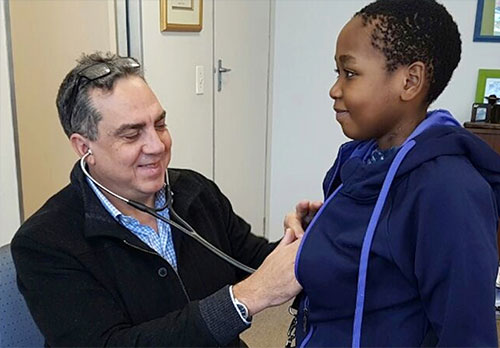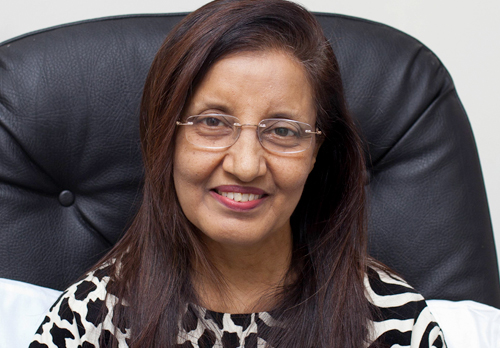Artificial cardiac device implantation is increasingly replacing donor heart transplantation in South Africa and around the world, and is likely to totally replace it within the next 10 to 15 years.
This is the view of Dr Willie Koen, an internationally renowned cardiac and transplant surgeon who practises at Netcare Christiaan Barnard Memorial Hospital in Cape Town. “Mechanical heart device implantation is reaching new levels of maturity internationally, to the extent that it already takes place twice as often as biological heart transplantation,” he added.
“In my view, mechanical heart implantation is changing the face of heart medicine and is resulting in a revolution in the field of cardiac replacement,” argued Dr Koen, who spoke at the weekend at the 26th World Congress Of The World Society Of Cardiothoracic Surgeons, which was jointly hosted with The 17th Annual SA Heart Congress.
“Mechanical implants do not as yet have the same longevity for the patient as the biological option, but can nevertheless currently support a patient for between six to eight years. We fully expect this to improve as artificial devices are undergoing rapid development, and there is little doubt that within the next decade or so they will have the longevity of the biological option which is 20 years or more.”
“The late Professor Christiaan Barnard, who performed the world's first human to human heart transplant at Groote Schuur Hospital in Cape Town on 3 December 1967, commented in the Cape Times in 2000 after we implanted the first artificial Berlin Heart, that he did not believe that mechanical transplantation would ever replace biological heart transplantation,” noted Dr Koen. “This is an indication of just how far artificial heart technology has come since then.”
Dr Koen, who is a founding member and vice-president of the Pan African Society of Cardio-thoracic Surgeons, said during an interview at the Congress, that mechanical implantation holds a number of advantages over biological heart transplantation. “Unlike donor hearts the mechanical devices are readily available. Patients therefore do not have to wait on the transplant waiting list for a matching donor heart as tragically, many patients run out of time and die before a matching heart can be found for them.”
“The mechanical devices, which include HeartWare HVAD and Thoratec Heartmate LVAD, require no anti-rejection drugs which often cause side effects in patients. And, while the artificial hearts are currently relatively expensive, they obviate the need to take costly drugs. Over the longer term therefore mechanical implantation is cost-effective, the saving on anti-rejection drugs making up the cost difference within a period of five years.
“We also expect these technologies to become cheaper as they become more widely adopted. This will make them more accessible to patients around South Africa and indeed the rest of the African continent, where heart transplantation is not an option for the overwhelming majority of patients because it simply is not available to them,” observed Dr Koen.
“We were recently able to perform a highly successful implantation procedure at Netcare Christiaan Barnard Memorial Hospital on a patient from Tanzania. She could not receive a biological transplantation because there is no transplantation programme in that country,” related Dr Koen.
“We were, however, able to work with international experts as well as the patient’s local doctors in Dar es Salaam, to ensure she could receive the necessary local and, if necessary, remote support from Cape Town for an HVAD implantation. The implantation was life-saving for this Tanzanian patient and she herself has said that she has been given a completely new lease on life as a result of it.
“In May this year, ten-year-old Philasande Dladla from Johannesburg, became the first child on the African continent to have a HVAD implanted to enable his damaged heart to continue functioning. Although Philasande is on the transplant list, a suitable matching donor heart for a child is extremely difficult to come by and another solution had to be found.”
“Artificial hearts are now making it possible to treat heart failure patients from around the continent and they are opening up a vast range of exciting new treatment possibilities. We really are looking at the future of heart replacement medicine,” affirmed Dr Koen.
 Cardiac and transplant surgeon Dr Willie Koen with ten-year-old Philasande Dladla of Johannesburg at Netcare Christiaan Barnard Memorial Hospital in Cape Town. In May 2016, Philasande became the first child on the African continent to have a HeartWare ventricular assist device (HVAD) mechanical heart implanted to enable his damaged heart to continue functioning.
Cardiac and transplant surgeon Dr Willie Koen with ten-year-old Philasande Dladla of Johannesburg at Netcare Christiaan Barnard Memorial Hospital in Cape Town. In May 2016, Philasande became the first child on the African continent to have a HeartWare ventricular assist device (HVAD) mechanical heart implanted to enable his damaged heart to continue functioning. Mrs Nurbanu Sonji from Dar es Salam in Tanzania was the first heart patient on the continent outside of South Africa to undergo an operation to implant a HeartWare ventricular assist device (HVAD) in August 2015. The external HVAD battery pack can be seen around her waist.
Mrs Nurbanu Sonji from Dar es Salam in Tanzania was the first heart patient on the continent outside of South Africa to undergo an operation to implant a HeartWare ventricular assist device (HVAD) in August 2015. The external HVAD battery pack can be seen around her waist.
He added that patients that are implanted with a mechanical heart can have a normal quality of life: drive cars, go on walks, work full day and so on. The greatest inconvenience for them is that they need to carry an external battery pack and the batteries need to be changed.
Dr Koen pointed out that that even this is rapidly changing: “As international research into Nano technology batteries, as well as remote charging technology, is ongoing, we believe that it is only a matter of time before the battery packs are made small enough to also be fully implantable.
“In South Africa the technology is currently reserved for INTERMACS 1-3 patients, which means it is used in critically ill patients who cannot wait any longer for a matching biological heart. It is ostensibly used as a temporary measure until a donor heart becomes available, but in practice they are increasingly being used as an alternative.”
According to Dr Koen, mechanical heart technology evolved at the same time as heart transplantation in early 1960s. Transplantation, however, tended to dominate over the following 45 years. Two approaches to transplantation developed: there were those who continued with biological transplant research, while other groups in the United States and Europe undertook research into mechanical implantation.
“We in South Africa kept up with the latest developments in mechanical implantation and were involved with device research at the University of Cape Town in the 1990s. The first clinical implants were done at Netcare Christiaan Barnard Memorial Hospital using the Berlin Heart, in 2000. This was a large device and patients had to remain in hospital after implantation. We upgraded to latest third generation levitation disc HVAD in 2012.”
Jacques du Plessis, managing director of the Netcare hospital division, says: “It has been an immense privilege for us to be able to work with such a pioneering and dedicated practitioner and researcher as Dr Koen.
“His contribution to the field of cardiac medicine has been considerable and its impact incalculable. He has worked tirelessly to make artificial heart implantations possible for all of the people of the country and indeed the continent, and it is in steady hands such as his that we place the future of local cardiac medicine,” concluded Du Plessis.
Ends
Issued by: Martina Nicholson Associates (MNA) on behalf of Netcare
Contact : Martina Nicholson, Graeme Swinney, Meggan Saville and Pieter Rossouw
Telephone: (011) 469 3016
Email: [email protected], [email protected], [email protected] or [email protected]